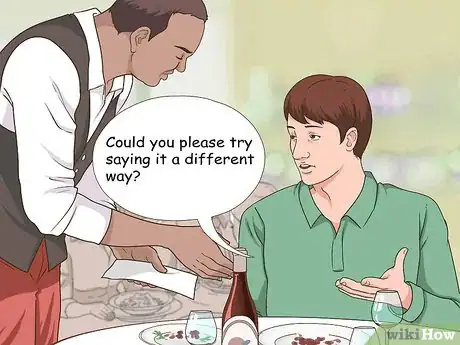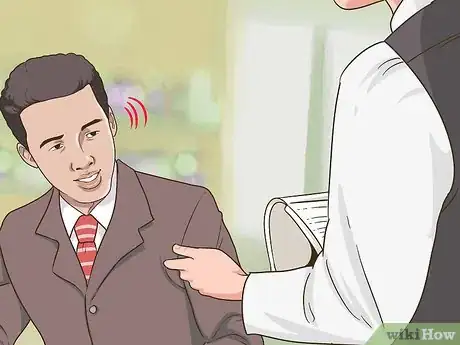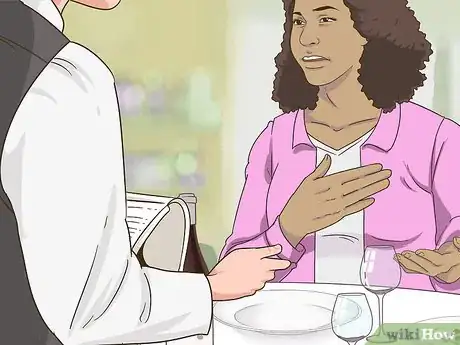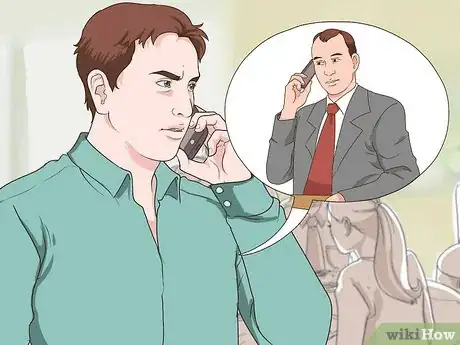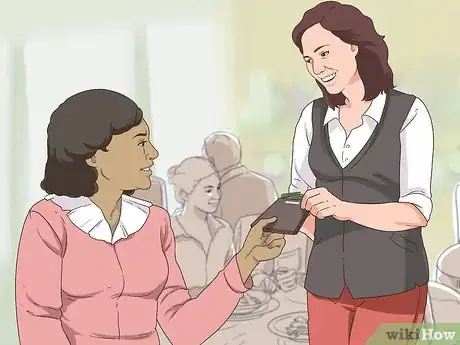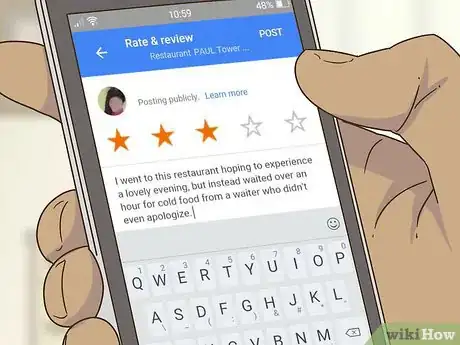This article was co-authored by wikiHow Staff. Our trained team of editors and researchers validate articles for accuracy and comprehensiveness. wikiHow's Content Management Team carefully monitors the work from our editorial staff to ensure that each article is backed by trusted research and meets our high quality standards.
This article has been viewed 35,795 times.
Learn more...
While eating out is usually a treat, sometimes things can go wrong. Experiencing a rude waiter can make you feel attacked, disrespected, and like an unwanted customer. Most restaurants want you to have your very best experience. By talking to the waiter directly, speaking with higher management, and preventing it from happening in the future, you can handle a rude waiter with ease.
Steps
Talking to the Waiter Directly
-
1State facts that concern you. Say, "I'm sorry, but this meat is uncooked." Be polite and speak in an even tone. The best way to handle rudeness is to bite your tongue and respond in a calm, cool manner.[1]
-
2Ask the waiter politely to repeat what they said. If the waiter’s rudeness came out of something they said, they may have said something on impulse or made a mistake. It's less likely they will be rude a second time. Say, “excuse me, it sounds like you just said something under your breath. Would you mind repeating what you said?”Advertisement
-
3Suggest the waiter rephrase their statement. Say, “I wasn’t sure what you meant by that last statement. Could you please try saying it a different way?” Let them know that you understand they are busy, but that you have concerns, too. Your waiter may lack proper communication skills or may have miscommunicated what they meant in that moment.
-
4Demand the waiter’s undivided attention. If your waiter isn’t giving you their undivided attention, they may not be able to communicate effectively. Sometimes waiters are too busy to realize when you need something. Wave your hand to get their attention. Say "excuse me, could I please have more mayonnaise?"
- To truly communicate a message means both parties must participate. Listeners must actively refocus on what the talker is saying and speakers must watch to see if the listener is understanding.[2]
-
5Be an active listener. While you can’t choose how your waiter responds to you, you can choose how you respond to them. Choose to be a better listener. By listening to your waiter, you are doing your part to effectively communicate.
-
6Observe your waiter’s behavior. If the waiter is rude to you because they hadn’t checked on you in over 10 minutes, observe them from afar. Look for how many tables they seem to be juggling. Note whether they are standing in the corner looking bored, or if they are they constantly on their feet the whole time. Step back, observe your surroundings, and put the situation into perspective.
- If your waiter is visibly ignoring you, let them know that you haven’t been attended to. This should be enough to remind them that they haven't done their job properly. If they are a good waiter they will attempt to make it up to you.
-
7Accept their apology if they give it. If the waiter said something they regret, they may realize what they did and apologize. It may be enough to have the person apologize so that you can both move forward.
Speaking with Higher Management
-
1Ask to see the manager. If the waiter continues to be rude to you, take the initiative by asking to speak to the manager. Ask your waiter, another waiter, or the hostess to please send the manager by your table.
- You could also ask to be served by a different waiter. Tell them, “We’d appreciate it if you could have someone else cover our table. Our waiter is being unprofessional.”[3]
- Once you inform the manager, you might even get a voucher for a free meal. Tip 15% on whatever the original check amount was.[4]
-
2Contact the business owner or head of the company. If you are still unhappy, contact someone with more company authority. Most companies are going to be very angry to hear that you were treated negatively and will want to make it up to you. If the waiter truly was rude, it may help you feel better to know that someone “higher up the ladder" reprimanded them.
- Only contact the business owner or head of the company if you truly feel that you were treated unfairly. Try to handle any miscommunications with the waiter or management first.
-
3Tip the restaurant the same. Except in cases of a severely dangerous situation (fire/severe injury/insult) you should tip your waiter 15%, or the standard tipping amount for your area. Remember, your waiter may be having an off day. Waiters are given a small paycheck, and many times rely on tips as their main source of income.[5]
- Many times waiters must share their tips with other waitstaff such as busboys, runners or other servers. Remember that you are taking away from their tips, too.[6]
- It may not be customary to tip in all English-speaking countries, so tip only where appropriate.
Preventing a Bad Experience from Reoccurring
-
1Leave a review online. If you truly feel you were taken advantage of in the situation, consider leaving a review online on the restaurant’s Google or Yelp page. Say, “I went to this restaurant hoping to experience a lovely evening, but instead waited over an hour for cold food from a waiter who didn't even apologize." Spreading the news of a rude occurrence is important for preventing other people from experiencing the same thing.
- Explain in your review how you attempted to remedy the situation. For example, say “I asked the waiter to clarify what he said, but he continued to be rude.” This will help to convince readers that you were still treated unfairly despite your attempt to work with the waiter.
- Understand that writing a bad restaurant review has its consequences. Many times these reviews become part of the restaurant's permanent reputation. People may lose their jobs if the story is bad enough.[7]
- Follow a restaurant critic’s code of ethics. Many professional restaurant critics wait until they have visited a location multiple times before writing a review. The reviewer is then able to judge whether poor customer service is frequent at that particular restaurant. If you feel as though you truly had a negative experience that others need to hear before they spend their money, then go ahead with posting your review.[8]
-
2Research new restaurants before trying them. Read reviews online on Google’s restaurant reviews before going to future restaurants. Ask friends and family what their opinion of the place is. You can also look up the restaurant on Facebook or on other social media sites to see read further reviews and comments.
-
3Allow yourself to move on. Take a deep breath and count to 10. Ask yourself "Is it worth my time to get upset over this?" If you’ve done everything you can do, it’s time to move on.
- Experiencing rude people is a part of life. Choose to spread positivism instead!
Community Q&A
-
QuestionWhat if a waiter refuses to get the food I ordered?
 IforgotmyoldpassCommunity AnswerThat is not necessarily rude. If it’s because they have run out of that item or don’t have it, then they can’t bring it to you. If you're breaching codes they've put in place for service, like being rowdy or wearing insufficient clothing, then they can ask you to leave (remember, a restaurant is private premises). However, if a waiter is just plainly refusing because they’re being rude to you, then you can ask why they can’t get it and it their answer is not sufficient, demand to see the manager immediately.
IforgotmyoldpassCommunity AnswerThat is not necessarily rude. If it’s because they have run out of that item or don’t have it, then they can’t bring it to you. If you're breaching codes they've put in place for service, like being rowdy or wearing insufficient clothing, then they can ask you to leave (remember, a restaurant is private premises). However, if a waiter is just plainly refusing because they’re being rude to you, then you can ask why they can’t get it and it their answer is not sufficient, demand to see the manager immediately. -
QuestionThe waiter keeps on flirting with my boyfriend whenever we go to the restaurant. We been there 3 times and the waitress keeps on flirting with my boyfriend. Both he and I are uncomfortable, what can we do?
 Community AnswerYou can ask her to stop, and make it clear to her that is makes you and your boyfriend uncomfortable. If she doesn't stop, then tell the manager or another waitress what is going on so that they can intervene and get it to stop.
Community AnswerYou can ask her to stop, and make it clear to her that is makes you and your boyfriend uncomfortable. If she doesn't stop, then tell the manager or another waitress what is going on so that they can intervene and get it to stop.
References
- ↑ https://www.psychologytoday.com/blog/the-athletes-way/201512/5-polite-ways-disarm-rude-people
- ↑ http://www.peoplemetrics.com/blog/combating-miscommunication-in-the-workplace-for-customer-centricity
- ↑ http://www.realsimple.com/work-life/work-life-etiquette/manners/rude-behavior/surly-service-people Usually the manager will attempt to fix the situation.
- ↑ http://gothamist.com/2014/04/22/my_waiter_was_rude_what_should_i_ti.php
- ↑ http://gothamist.com/2014/04/22/my_waiter_was_rude_what_should_i_ti.php
- ↑ http://gothamist.com/2014/04/22/my_waiter_was_rude_what_should_i_ti.php
- ↑ http://www.amateurgourmet.com/2012/06/when-is-it-ok-to-write-a-bad-yelp-review-of-a-restaurant.html
- ↑ http://www.amateurgourmet.com/2012/06/when-is-it-ok-to-write-a-bad-yelp-review-of-a-restaurant.html


